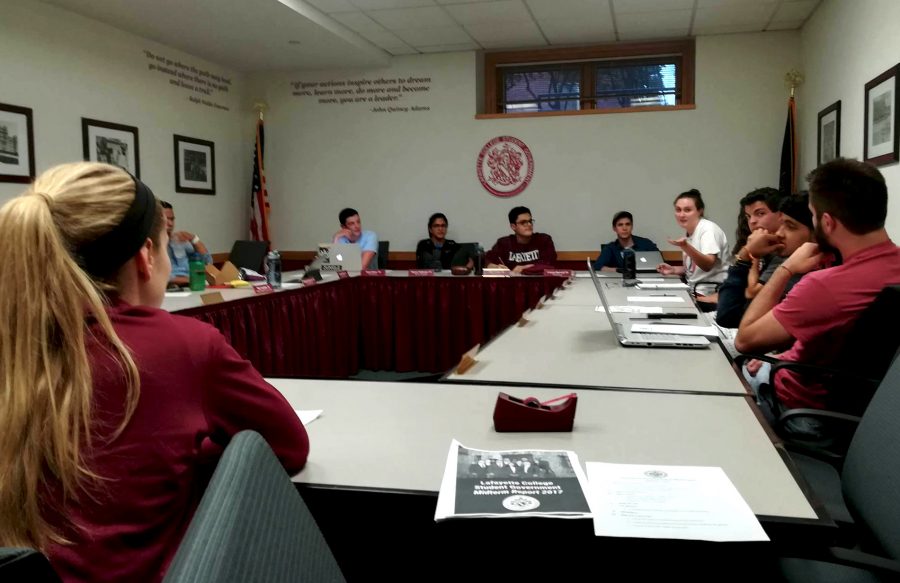Student government is proposing changes to both its constitution and its bylaws, the first structural changes made to the organization in over 30 years.
The Ad-Hoc Committee on Organizational Reform, consisting of student government members Jesse Glaser ’19, Shreya Nebhwani ’19, Connor Burwell ’19 and Mia Coutinho ’20, formed this year originally to address changes to position terms.
In 1986, when the last structural changes were made, student government moved from academic terms to calendar year terms, but now, student government feels they should switch back, said Burwell, who is currently the secretary of student government.
Currently, elections are held in the fall semester, and students assume their positions at the beginning of the spring semester. Then, once they return to campus the following year, they finish their term that fall. However, this summer-long break was viewed as problematic.
“When members come back after the summer break they’re just exhausted, and it’s hard to get the wheel rolling again,” class representative Pascual Ventura ’19 said. “It doesn’t go hand in hand because you’re in the middle of two [calendar years].”
Switching from calendar year terms to academic year terms is one of the three main constitutional changes the committee is proposing. The other two changes include increasing the size of student government from 15 to 36 students and implementing both elected and appointed positions.
In this new structure, the president and vice president would be elected in March, followed by the election of the treasurer, executive secretary and six other committee directors in April, Burwell said. The additional 26 members would go through an application process later in April. These students would take office late the following August, and then freshmen would apply and join in September.
Applications would be reviewed and selected by the elected executive committee. Burwell said applications will allow more students to get involved in things that directly interest them, rather than being appointed to committees once they are already a part of student government.
“We also think applying to join the committees makes student government more accessible because right now, what makes a good committee member is not the ability to campaign well or being as popular as someone else, it’s the interest and dedication you show to completing the work,” Burwell said.
All three proposed constitutional changes to student government must be presented to both the Full Faculty Committee and the student government general body.
In order for this to occur, the general body must pass the changes with a three quarters majority before Nov. 9 at 4 p.m., Burwell wrote in an email. The changes are then passed to the Student Life Faculty Committee, which, if they approve, will then proceed to the Full Faculty Committee for approval on Dec. 5.
Aside from constitutional changes, the ad-hoc committee is also proposing several changes to the bylaws, which includes the addition and removal of and changes to some committees.
The three main committee additions include an athletics committee, a Greek life committee and a sustainability committee that would work with Sustainability Director Marie Fechik-Kirk.
Discussions are still occurring on the structures of the committees, but Burwell said it is likely that an athlete and a member of Greek life would be the directors of their respective committees.
While discussions with Advisor to Fraternities and Sororities Dan Ayala are still under way, the Greek life committee itself will most likely be composed of both Greek and non-greek members, and freshmen will not be allowed to apply for that committee, Burwell added.
The ad-hoc committee hopes to see the proposed changes implemented in order to hold the first elections for the new structure this coming spring. If this occurs, Burwell said there are still discussions on how student government would work in the interim period.
“We were thinking that the people already on terms should be extended, although many people are going abroad or aren’t staying on student government,” Burwell said. “So we would need to fill the rest of those spots, and figure out next semester, as we’re transitioning, what is student government going to look like.”
However, both Burwell and Ventura said they feel these changes are important to improving accessibility and increasing participation in student government.
“We also cannot reach out the community as much as we want to which is why we’re hoping to increase the size and also diversify our committees and have more people within the committees [to] have a broader reach in our campus,” Ventura said.
Student government will be holding two open sessions with student body on Nov. 6 and Nov. 8 to discuss the proposed changes.





















































































































